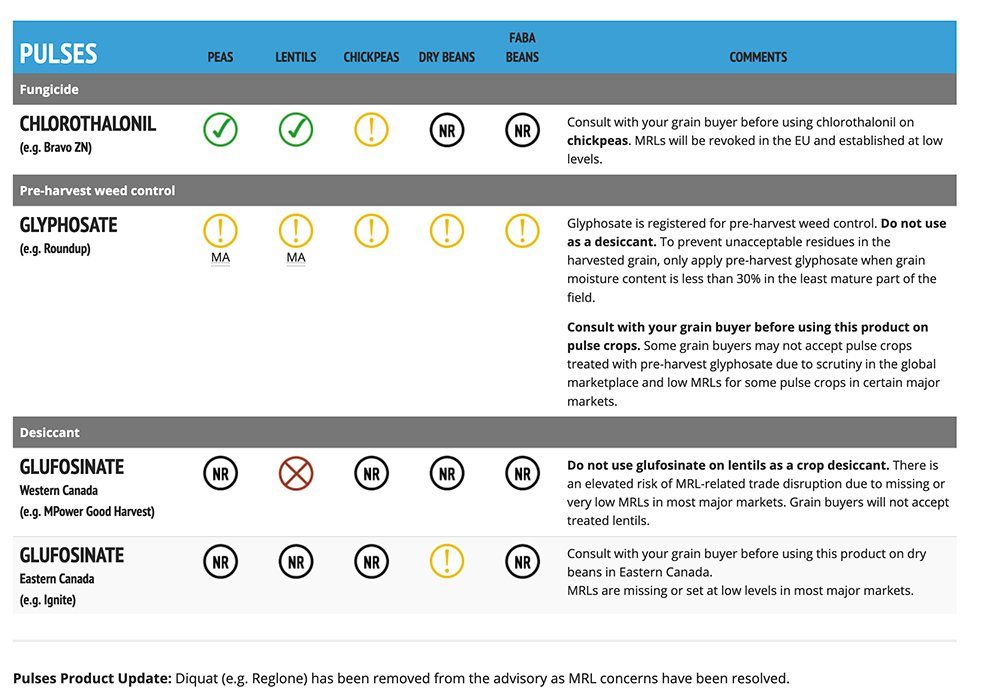Diquat use as pulse desiccant eased

Ag commodity organizations in Canada are encouraging grain, pulse and oilseed producers to review an updated product advisory chart identifying farm chemicals that have the potential to cause marketing and trade disruptions in 2021.
The Keep It Clean advisory chart can be viewed online at keepitclean.ca/product-advisory.
It is aimed at ensuring that crops grown in Canada and shipped abroad adhere to established acceptable residue levels, or maximum residue levels (MRLs) in key export markets.
“This is all about market access,” said Gord Kurbis, vice-president of trade policy and crop protection with the Grains Council of Canada.
“Nobody needs to be reminded about how export dependent we are in Canada and we’re probably going into… what most people agree is a more uncertain area in terms of international trade.
“We’re seeing more trade liberalization with more trade agreements but as that happens, we’re seeing more weird non-tariff barriers come up….
“We don’t want pesticide residues to become a part of that….”
Last week, officials from Cereals Canada, Pulse Canada and the Canola Council of Canada took part in a web event highlighting chemicals of concern, as well as important changes to this year’s Keep It Clean product advisory list.
One of the key changes to this year’s list was the removal of diquat (Reglone) as a chemical of potential concern when used as a pulse crop desiccant.
Diquat has been registered as a pulse desiccant in Canada for years but it still presented a potential trade risk for pulse growers and pulse crop exporters because the United States had not yet established an MRL for it.
That changed last fall when the U.S. established a long-awaited import tolerance and put in place diquat MRLs that are harmonized with Canada’s.
“This is good news for growers,” said Greg Bartley, director of crop protection and crop quality with Pulse Canada.
“This is a long-standing issue that we’ve had… with the U.S.”
“Now that these MRLs have been harmonized and the U.S. has established an import tolerance… diquat has been removed from the 2021 product advisory.”
The removal of diquat as a chemical of potential concern means that growers should have no reason to fear using the product as a pulse crop desiccant, as long as label directions are followed.
It’s a different story, however, for the use of generic glufosinate ammonium products, such as MPower Good Harvest.
Generic glufosinate is registered for use as a desiccant on lentils in Western Canadian but due to the absence of MRLs in some major markets or misaligned MRLs in others, Pulse Canada is recommending against its use on prairie lentil crops until MRL concerns have been resolved.
“For Western Canada, we are continuing the classification of a red or do-not-use due to missing or misaligned MRLs,” said Bartley.
“We do not have MRLs established at Codex or the U.S., and the levels are established at a default level in the European Union at 0.03 parts per million so this is a major risk.
“We really highly recommend that growers not use this product on lentils.”
Bartley also reminded growers that Liberty branded glufosinate products are not registered for use as a desiccant on western Canadian lentils.
Pulse Canada also recommended caution when using chlorothalonil-based fungicides, such as Bravo ZN, on chickpeas.
The European Union has signalled its intention to drop the MRLs for chlorothalonil to default levels of 0.01 ppm on chickpeas later in the growing season.
That could create problems, especially for containerized chickpea exports, where there is less opportunity for blending to reduce residue levels.
“Talk to your buyers before using this product,” Bartley said.
This could cause a problem “if your buyer is sending a lot of chickpeas to the EU, especially knowing that chickpeas do go into container shipments.”
For cereals, Cereals Canada is advising caution when using chlormequat-based plant growth regulators (PGRs) such as Manipulator on barley.
Before using these products, growers should check with grain buyers to confirm contract obligations and acceptance criteria.
PGRs can have an impact on germination during the malting process.
As always, pre-harvest glyphosate should be used with caution as a pre-harvest weed control product on all cereals and should be avoided entirely on malt barley crops, along with saflufenacil products, such as Heat and Harvest.
Pre-harvest weed control products that are registered in Canada should not be used as crop desiccants and should always be used according to label directions.
Growers should pay particular attention to pre-harvest intervals to ensure that registered glyphosate products do not increase the risk of potential trade disruptions.

